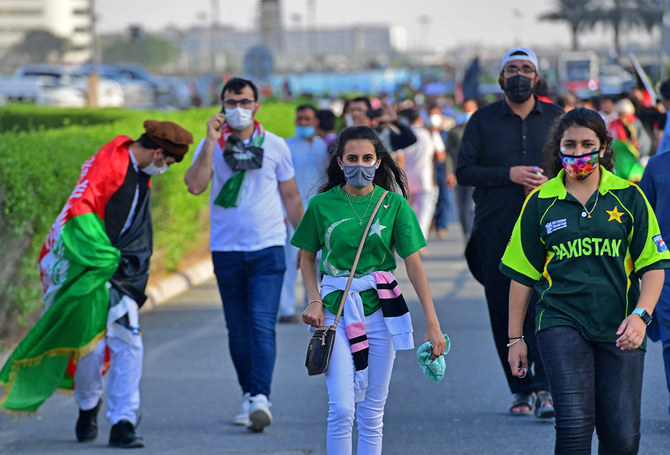ISLAMABAD: The International Cricket Council (ICC) on Friday issued an apology to people with valid tickets for the Twenty20 World Cup match between Pakistan and Afghanistan who could not enter the stadium due to the ticketless fans who tried to force their way in the venue.
According to the Associated Press, several “ticketless fans, mostly carrying Afghan flags, tried to enter the Dubai International Cricket Stadium,” forcing the police to close all the gates an hour after the game had started.
The ICC said in its statement that more than 16,000 tickets had been issued for the World Cup game, though not all of the fans who got them managed to enter the stadium since Dubai police and security staff secured the stadium “to maintain a safe and controlled environment inside the venue.”
“The ICC, BCCI [Board of Control for Cricket in India] and ECB [Emirates Cricket Board] apologize to any fans with valid tickets who were unable to enter the stadium tonight and request they contact the ticket provider,” said the statement.
Afghanistan captain Mohammad Nabi also urged his country’s fans to “please buy tickets” after the game instead of forcing their way into stadiums.
The ICC also asked the Emirates Cricket Board to investigate the incident to see if any lessons could be learned and similar situations avoided in future.
International Cricket Council apologizes to fans after Pakistan, Afghanistan T20 match
https://arab.news/gbarw
International Cricket Council apologizes to fans after Pakistan, Afghanistan T20 match

- Several cricket fans with valid tickets could not enter the stadium since Dubai police had to shut the gates for security reasons
- ICC said more than 16,000 tickets had been issued for the World Cup game
Pakistan arrests Daesh suspects, including Afghan ‘mastermind,’ after Islamabad mosque attack

- Interior minister says attack was planned and suicide bomber trained in neighboring Afghanistan
- Suicide bombing targeted worshippers on Islamabad’s outskirts, killing 32 and wounding over 150
ISLAMABAD: A police officer was killed and four suspects, including an Afghan national who worked for Daesh and masterminded a deadly suicide bombing in the Pakistani capital a day earlier, were arrested in overnight raids, according to Pakistan’s Interior Minister Mohsin Naqvi, who addressed a news conference on Saturday.
Officials have confirmed 32 deaths from Friday’s blast at the Qasr-e-Khadijatul Kubra mosque and imambargah in the Tarlai Kallan area on Islamabad’s outskirts, with more than 150 others injured.
The blast occurred during Friday prayers, when mosques around the country are packed with worshippers. A regional Daesh affiliate said one of its members had targeted the congregation by detonating an explosive vest.
“Immediately after the explosion, raids were carried out in Peshawar and Nowshera, and four of the facilitators [of the suicide bomber] were arrested,” Naqvi told the media in Islamabad. “The best thing that happened was that their mastermind, who is an Afghan affiliated with Daesh, was also apprehended.”
He confirmed that a Khyber Pakhtunkhwa police officer lost his life during a raid carried out at night, while a few others were also injured.
“The main mastermind is related to Daesh, and he is now under our custody,” he continued. “All the planning and training of this incident had been done by Daesh inside Afghanistan. These people are now with us, telling us all the details of how he [the bomber] was taken [to the neighboring country] and how he was trained there.”
Naqvi’s ministry also shared a brief statement on social media, saying that a breakthrough in the case was made through “technical and human intelligence” before coordinated raids were conducted to arrest the suspects.
“The nexus of terrorism under Afghan Taliban patronage remains a serious threat to regional peace,” it added.
The interior minister echoed the same concern while accusing India of bankrolling the militant operations against Pakistan.
“Now, you are taking the name of Daesh, or you are taking the name of Taliban,” he said while talking to journalists.
“They [the militants] are getting this funding from somewhere, someone is giving them this target.”
“I again want to tell you with clarity that all their funding is being given by India,” he added. “All their targets are being given by India.”
Islamabad has long accused Kabul of allowing its soil to be used by militant groups and New Delhi of backing their cross-border attacks against Pakistani civilians and security forces. However, the Afghan and Indian governments have consistently denied the allegations.
The police officer, who was killed in the shootout with militants in the northwestern district of Nowshera, was identified as Assistant Sub-Inspector Ejaz Khattak, Nowshera police spokesperson Turk Ali Shah told Arab News.
Friday’s mosque blast was the deadliest in Islamabad since a 2008 suicide bombing at the Marriott Hotel that killed 63 people and wounded more than 250. Last year in November, a suicide bomber struck outside a court in the capital, killing 12 people.
The latest attack comes as Prime Minister Shehbaz Sharif’s government deals with a surge in militancy across Pakistan. Pakistani officials have said the attacker was a Pakistani national who had recently traveled to Afghanistan.










